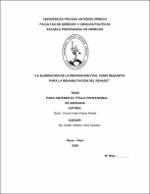Mostrar el registro sencillo del ítem
La eliminación de la reparación civil como requisito para la rehabilitación del penado
| dc.contributor.advisor | Vera Infantes, Edder Alberto | |
| dc.contributor.author | Chuna Imán, Eliana Mariel | |
| dc.creator | Chuna Imán , Eliana Mariel | |
| dc.date.accessioned | 2021-03-18T01:28:31Z | |
| dc.date.available | 2021-03-18T01:28:31Z | |
| dc.date.issued | 2021 | |
| dc.identifier.uri | https://hdl.handle.net/20.500.12759/7284 | |
| dc.description.abstract | La presente investigación toca uno de los problemas observados y harto discutidos en el sistema de administración de justicia al que hemos denominado “LA ELIMINACION REPARACIÓN CIVIL COMO REQUISITO PARA LA REHABILITACIÓN DEL PENADO”. Este tema ha sido objeto de debate por connotados doctrinarios y operadores de justicia en nuestro medio; el presente trabajo se centra en Determinar de qué manera el requisito de reparación civil, contenido en el Decreto Legislativo N° 1453, incorporado en el Artículo 69° del Código Penal vulnera la rehabilitación del penado. Los métodos usados en esta investigación obedecen a métodos lógicos, siguiendo un análisis deductivo, analítico – sintético y comparativo, también hemos recurrido a los métodos jurídicos en los cuales nos permiten interpretar hermenéuticamente el Código Penal. A la vez que mediante el método doctrinario seleccionamos las posturas que se ajusten a nuestras posturas, en esta línea sigue el método dialectico y el método de análisis económico. Los resultados de nuestra investigación se presenta a modo de conclusiones donde finalmente expresamos que: Las penas en el Perú a decir de la doctrina, la jurisprudencia tanto de la Corte Suprema, del Tribunal Constitucional, así como legislación a nivel legal y constitucional; la pena tiene un fin preventivo, es decir, no busca una retribución del mal por mal (teoría absoluta), sino que le asigna a la sanción penal una utilidad, la misma que viene dada por la rehabilitación, reeducación y reincorporación del penado a la sociedad. | es_PE |
| dc.description.abstract | This investigation touches on one of the problems observed and fed up discussed in the system of administration of justice which we have called “Civil Reparation as a Requirement for the Rehabilitation of the Sentence“, this issue has been the subject of contention doctrinaire and operators of justice in our midst; the present work focuses on determining how the civil redress requirement, contained in legislative decree No. 1453 incorporated in Article 69° the criminal code violates the rehabilitation of the sentence. The methods used in this investigation follow logical methods, following a deductive, analytical – synthetic and comparative analysis, we have also resorted to the legal methods in which they allow us to interpret the penal code hermeneutically. While the doctrinal method selects the positions that fit our positions, in this line follows the dialectic method and the method of economic analysis. The results of our investigation are presented as conclusions where we finally express that: The penalties in Peru to say of the doctrine, the jurisprudence of both the Supreme Court, the Constitutional Court, as well as legislation at the legal and constitutional; the penalty has a preventive purpose, that is, it does not seek a retribution of evil for evil (absolute theory), but assigns to the criminal penalty a utility, the same that is given by rehabilitation, re-education and reinstatement of the sentence to society. | en_US |
| dc.description.uri | Tesis | es_PE |
| dc.format | application/pdf | es_PE |
| dc.language.iso | spa | es_PE |
| dc.publisher | Universidad Privada Antenor Orrego - UPAO | es_PE |
| dc.relation.ispartofseries | T_DERP_008 | |
| dc.rights | info:eu-repo/semantics/openAccess | es_PE |
| dc.source | Universidad Privada Antenor Orrego | es_PE |
| dc.source | Repositorio Institucional - UPAO | es_PE |
| dc.subject | Reparación civil | es_PE |
| dc.subject | Rehabilitación | es_PE |
| dc.subject | Pena | es_PE |
| dc.title | La eliminación de la reparación civil como requisito para la rehabilitación del penado | es_PE |
| dc.type | info:eu-repo/semantics/bachelorThesis | es_PE |
| thesis.degree.grantor | Universidad Privada Antenor Orrego. Facultad de Derecho y Ciencias Políticas | es_PE |
| thesis.degree.name | Abogado | es_PE |
| thesis.degree.discipline | Derecho | es_PE |
| dc.subject.ocde | http://purl.org/pe-repo/ocde/ford#5.05.01 | es_PE |
| renati.advisor.orcid | https://orcid.org/0000-0002-1565-2613 | es_PE |
| renati.author.dni | 76944085 | |
| renati.advisor.dni | 42405171 | |
| renati.type | http://purl.org/pe-repo/renati/type#tesis | es_PE |
| renati.level | http://purl.org/pe-repo/renati/nivel#tituloProfesional | es_PE |
| renati.discipline | 421016 | es_PE |
| renati.juror | Estrada Díaz, Juan José | |
| renati.juror | Tapia Díaz, Jessie Catherine | |
| renati.juror | Mauricio Juárez, Francisco Javier | |
| dc.publisher.country | PE | es_PE |
Ficheros en el ítem
Este ítem aparece en la(s) siguiente(s) colección(es)
-
Derecho [431]

